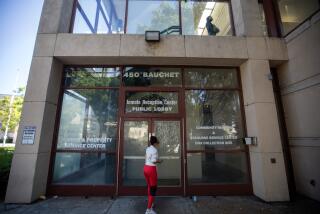O.C. deputies complained of lax policies before 2016 jail escape, but they were ignored, grand jury finds
Deputies at the Central Men’s Jail in Santa Ana had long complained of flawed inmate monitoring procedures that allowed three men to escape from the facility last year, but nothing was done to correct the problem, according to a report released by the Orange County Grand Jury this week.
The scathing study listed failures by officials that contributed to the escape, which made national headlines and became a major embarrassment for the Orange County Sheriff’s Department.
The grand jury cited a flawed inmate counting procedure, the failure of deputies to remove jerry-built tents around the escapees’ bunks that may have concealed their activites and inadequate monitoring of the jail’s plumbing system, which the inmates used to gain access to the roof, as major factors in the escape.
A lack of surveillance cameras and lighting in the plumbing tunnels and on the roof, which the inmates rappelled down from before, were also cited as problematic in the report.
Deputies failed to catch on to an escape plot even though the report found it likely took months of planning and would have involved loud sawing and cutting as the prisoners worked to gain access to the plumbing tunnels.
Authorities have said that Hossein Nayeri, Jonathan Tieu and Bac Duong were able to obtain a cutting tool and saw through several layers of metal and rebar when they broke out of the jail in January 2016, sparking a statewide manhunt that lasted nearly a week, according to the report.
Jail staff did not become aware of the escape until 15 hours after the trio climbed to the roof of the jail and fled, a time lapse that likely helped the fugitives stay well ahead of their pursuers. The men had been jailed on charges including attempted murder and torture.
“After conducting a comprehensive study, problems with both supervision and training became obvious,” the report read. “Lack of compliance with existing policies and procedures by various [Orange County Sheriff’s Department] personnel at all levels was the primary factor responsible for the escape.”
The inmates took a cab driver hostage and traveled as far north as the Bay Area. Their escape plot began unraveling days later, police say, when Duong rejected Nayeri’s plan to kill their hostage and fled to a San Jose motel with the cab driver.
Duong drove back to Orange County and surrendered to authorities on Jan. 29. Nayeri and Tieu were arrested in San Francisco the next day. The men are due in court for preliminary hearings in June, records show.
Jail staff were supposed to conduct two types of inmate counts a total of five times each day, according to the report.
“Module Book Counts,” which involve deputies approaching an inmate and comparing his appearance to a booking photo, were to be conducted twice daily, the report said.
“Statistical Body Counts,” which involve tallying both the number of inmates meant to be in the jail and those who might be absent due to a court appearance, were to be conducted three times a day.
A lawsuit filed last year by the union representing rank-and-file sheriff’s deputies contended staffing cuts led jail personnel to conduct just two daily checks.
About a year before the escape, some staff members who had been transferred to Central Men’s Jail from another county facility told supervisors about the laid-back inmate counting procedures, but their complaints were ignored, the grand jury report said.
“They had previously been assigned to another facility where the importance of conducting the counts ‘by the book’ had been emphasized and strictly enforced. They brought this concern to [Central Men’s Jail] leadership,” the report read. “These concerns were never acted upon.”
In the year since the breakout, the Sheriff’s Department has attempted to re-fortify the Santa Ana jail, which was built in 1968. Intense lighting now covers the outside of the building and the interior tunnels, while metal grilles were added to the tunnel vents.
Motion-sensitive cameras monitor every nook and cranny of the jail now, including the plumbing tunnels. The jail has also strengthened its procedures for preventing the smuggling of contraband into the facility. Canine units specifically trained to detect drugs and cellphones are now a routine sight. The department is also using radio frequency identification technology to track inmates movements to and from their cells. In all, the department spent at least $570,000 on short-term improvements.

Still, key questions about the escape remain unanswered.
The grand jury reviewed thousands of pages of internal documents and interviewed dozens of Sheriff’s Department personnel as part of its investigation, but it remains unclear how the cutting tools used in the escape were smuggled past security.
One of Duong’s associates, Loc Ba Nguyen, has been charged with providing the tools used in the breakout and driving the escapees from the jail after they rappelled down from the roof. Orange County Sheriff Sandra Hutchens said investigators believe the men took the cutting tool with them, and an agency spokesman has said the device was never found.
It also remains unclear how the men obtained a cell phone, which they used to take photos inside the jail and call Nguyen, the man accused of picking them up outside, officials said.
Nooshafarin Ravaghi, a teacher at the jail who became friendly with Nayeri, was arrested last year and accused of aiding in the escape, but prosecutors declined to charge her and publicly criticized Hutchens for announcing her arrest.
Dozens of deputies and staff have been questioned during a lengthy internal review of the escape, but there is no indication any deputies or civilian staff members were involved in the smuggling of contraband to the escapees, according to Hutchens. Capt. Chris Wilson, who oversaw the jail at the time of the escape, was transferred from that post and later retired, officials have said.
Tom Dominguez, president of the union representing rank-and-file deputies, said Wilson was one of several high-ranking sheriff’s department officials who ignored complaints about the improper count procedure. The union sued the county last year, claiming staffing cutbacks made it easier for the men to escape.
“In essence, the count procedure was nullified by sheriff’s administration with the direction ‘we’ll get back to you’ and of course they never did,” he said.
Dominguez said he was “not aware” of any other command staff in the jail who were transferred after the escape.
The department has yet to issue an after-action report on the incident, which would follow normal protocols for major events, because of the ongoing criminal case, according to Lt. Lane Lagaret, a department spokesman.
Lagaret said he would be unable to respond to a list of additional questions from The Times on Friday, but the department did issue a statement this week highlighting improvements to the jail since the escape.
“When the escape occurred in January 2016, the department acknowledged failures and need for improvement,” the statement read. “Those improvements have been made and the jail is secure. Orange County residents can feel confident that we have made the necessary changes to meet our current security needs and that we have a proactive plan in place for additional upgrades.”
Follow @JamesQueallyLAT for crime and police news in California.
Twitter: @lacrimes
ALSO
4 men arrested on suspicion of trying to pay for sex with underage girls
Man vandalizes three Rodeo Drive boutiques by driving Mercedes into them, police say
Los Angeles firefighters salute colleague who died on duty after medical emergency
More to Read
Sign up for Essential California
The most important California stories and recommendations in your inbox every morning.
You may occasionally receive promotional content from the Los Angeles Times.












